Dhikala Zone: The Ultimate Safari Experience in Jim Corbett
Introduction: Nestled deep within the heart of Jim Corbett National Park, the Dhikala Zone is a haven for wildlife enthusiasts and nature lovers. Revered as one of the most prominent zones in the park, Dhikala offers an unparalleled experience of India’s rich biodiversity. From the elusive Bengal tiger to the majestic Asiatic elephant, this area is teeming with life, offering visitors a rare glimpse into the wild. But what makes Dhikala truly special? In this comprehensive guide, we’ll explore everything you need to know about visiting this remarkable wilderness.
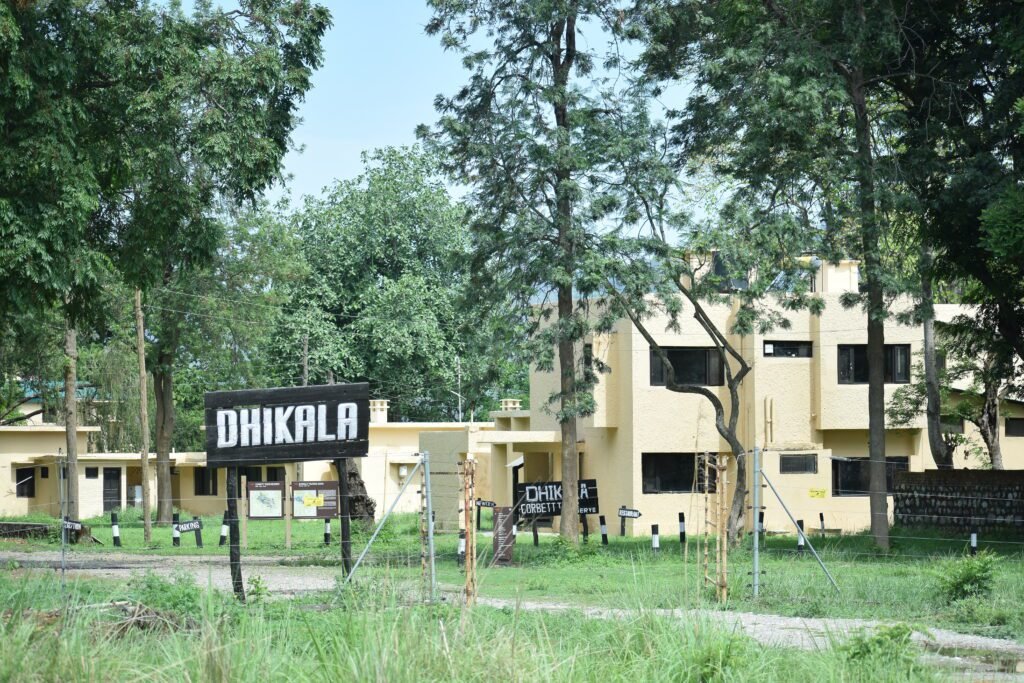
History of Dhikala Zone
The history of Dhikala Zone is deeply intertwined with the legacy of Jim Corbett National Park, which was established in 1936 as Hailey National Park. Over time, Dhikala emerged as a vital area for wildlife preservation due to its rich and diverse habitat. Named after the small village of Dhikala, this zone was historically a dense forest area where wildlife thrived without much human interference. Today, it stands as a symbol of conservation success, attracting visitors from around the globe.
Geographical Significance
Dhikala Zone is strategically located in the core area of Jim Corbett National Park, offering a unique blend of terrains. From vast grasslands to dense forests and the meandering Ramganga River, the landscape here is as diverse as the wildlife it supports. The Ramganga River plays a crucial role in sustaining the ecosystem, providing water for the animals and maintaining the lush vegetation that characterizes this zone.
Jim Corbett Packages
Dhikala 1 Night Stay
Dhikala 2 Nights Stay
Dhikala 3 Nights Stay
Safari Experience in Dhikala Zone
A safari in Dhikala Zone is an unforgettable adventure, offering the chance to see wildlife up close.
Jeep Safari: This is the most popular option, providing flexibility and a closer look at the animals. It’s recommended to go for an early morning or late afternoon safari for the best sightings.
Canter Safari: For larger groups, a canter safari is available. While it’s less personal than a jeep safari, it still offers a great opportunity to see the wildlife.
What to Expect on a Safari: Safaris typically last for 3-4 hours. Along with the possibility of spotting tigers, you’ll likely see elephants, deer, and a variety of birds.
Safety Guidelines: It’s essential to listen carefully to your guide’s instructions at all times. Do not attempt to feed or approach wildlife, and remain inside the vehicle at all times.
Flora and Fauna in Dhikala Zone
The biodiversity in Dhikala is truly astounding. The zone is home to a wide variety of flora and fauna, making it a hotspot for wildlife observation.
Bengal Tigers: Dhikala is one of the best places in India to spot the elusive Bengal tiger in its natural habitat. The dense forests provide perfect cover for these majestic predators, and the open grasslands offer prime hunting grounds.
Asiatic Elephants: These gentle giants are a common sight in Dhikala, especially around water sources. Herds of elephants can often be seen grazing in the grasslands, offering a spectacular view for visitors.
Crocodiles and Alligators: The Ramganga River is home to a significant population of crocodiles and alligators. These ancient reptiles can often be spotted basking on the riverbanks.
Bird Watching: With over 500 species of birds, Dhikala is a paradise for bird watchers. From raptors like the crested serpent eagle to waterfowl and migratory species, the variety is endless.
Accommodation Options For Tourists In Dhikala Zone
- Dhikala Forest Rest House
- Gairal Forest Rest House
- Sarapduli Forest Rest House
- Khinnanauli Forest Rest House
- Sultan Forest Rest House
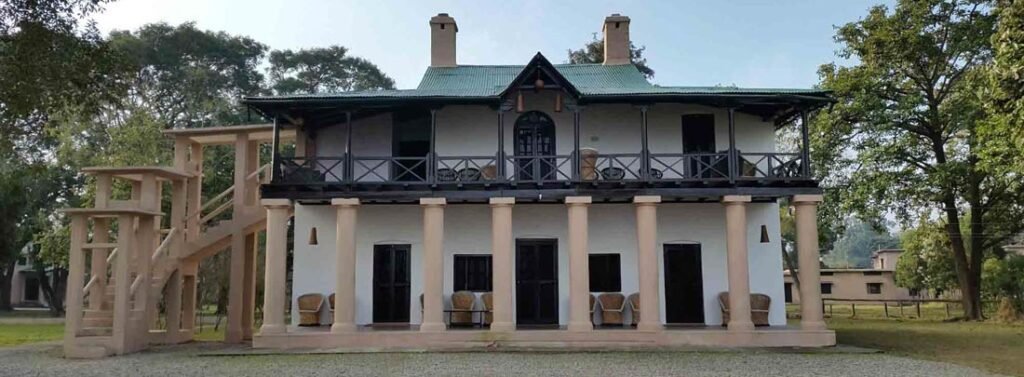
Dhikala FRH
The Dhikala Forest Lodge’s deep forest location more than compensates for its simple accommodations, though these were significantly upgraded in 2006. Nestled in the heart of the wilderness, the lodge offers guests the rare chance to observe wildlife directly from the verandah of their rooms. The rooms have been renovated, offering a level of comfort that surpasses typical standards for jungle stays in India.The Dhikala Forest Rest House is approximately 30 kilometers from the Dhangari Gate, the main entry point for the Dhikala Zone in Jim Corbett National Park. The drive to Dhikala typically takes around an hour, depending on road conditions.
New Forest House – 4 rooms
Annexe – 7 rooms
Hutment – 6 rooms
Cabin – 3 room
Dormitory – 12 Bed
Restaurant – Available (Buffet system)
Canteen – Available
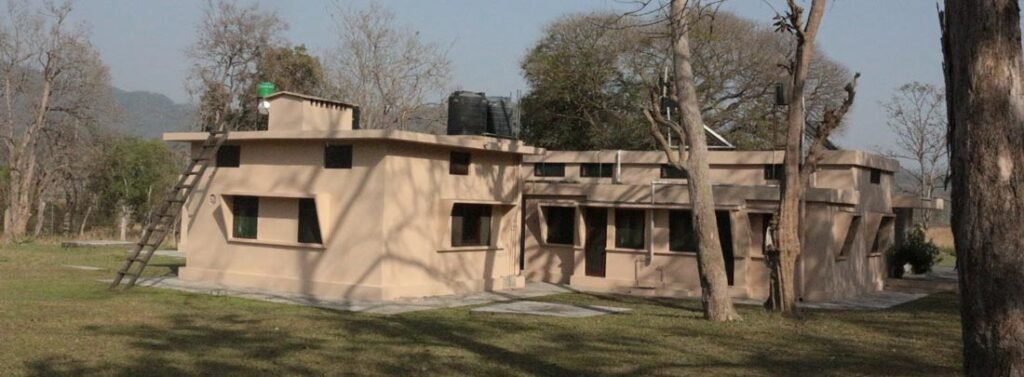
Gairal FRH
The Gairal Forest Rest House is a serene retreat located within Jim Corbett National Park. Nestled along the banks of the Ramganga River, it offers a peaceful and secluded environment for nature lovers. The rest house provides basic accommodations with the charm of being surrounded by dense forests. While it lacks modern amenities, its simplicity adds to the authentic jungle experience. Gairal is an excellent spot for birdwatching, and guests often see wildlife in the nearby area, making it a favored destination for those seeking tranquility in the wild.The Gairal Forest Rest House is about 20 kilometers from the Dhangari Gate in Jim Corbett National Park. The drive from the gate to Gairal usually takes around 45 minutes, depending on road conditions.
New Forest Rest House – 4 rooms
Old Forest Rest House – 2 rooms
Dormitory – 8 Bed
Canteen – Available
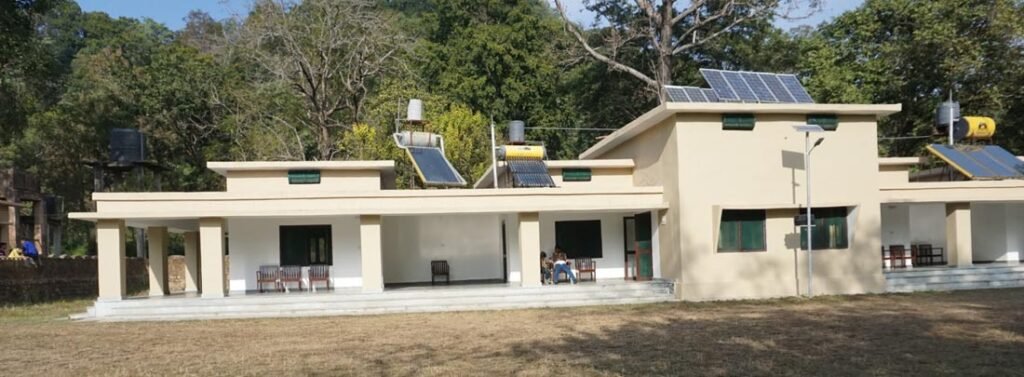
Khinnanauli FRH
Khinnanauli Forest Lodge is a tranquil hideaway within Jim Corbett National Park, offering visitors a peaceful retreat amidst dense forests and open grasslands. Known for its strategic location, the lodge provides easy access to prime wildlife viewing areas, making it ideal for spotting tigers, elephants, and a variety of other animals. The lodge features comfortable accommodations with essential amenities, ensuring a pleasant stay while maintaining a close connection to nature. The Khinnanauli Forest Rest House is approximately 15 kilometers from the Dhangari Gate in Jim Corbett National Park. The drive from the gate to Khinnanauli generally takes around 30 to 40 minutes, depending on road conditions.
Forest Rest House – 3 Rooms ( Only For VIP Persons)
Canteen – Not Available
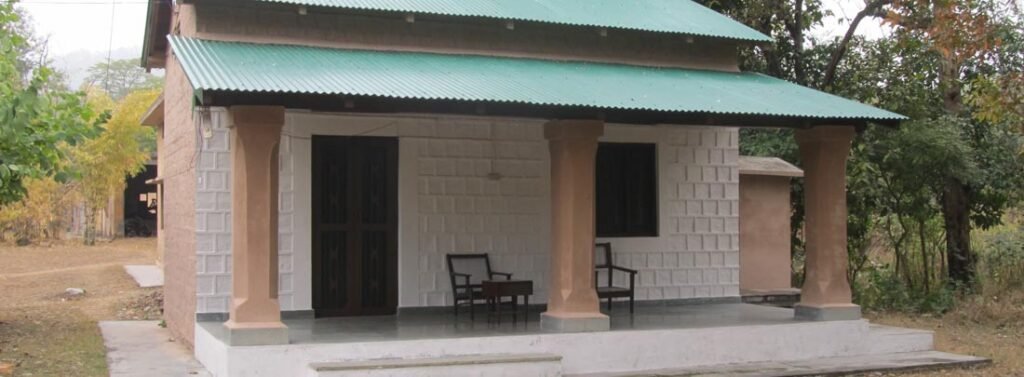
Sarapduli FRH
Sarapduli Forest Rest House is a secluded and peaceful accommodation within Jim Corbett National Park, located near the Ramganga River. Known for its serene surroundings, it offers basic but comfortable lodging, perfect for those who wish to be close to nature. The area around Sarapduli is a hotspot for wildlife sightings, including tigers, elephants, and various bird species. Its remote location makes it a favored choice for wildlife enthusiasts and photographers looking for an authentic jungle experience away from the crowds.The Sarapduli Forest Rest House is about 25 kilometers from the Dhangari Gate in Jim Corbett National Park. The drive typically takes around 45 minutes to an hour, depending on road conditions.
Forest Rest House – 3 Double Rooms
Dormitory – 03 bed
Canteen – Available
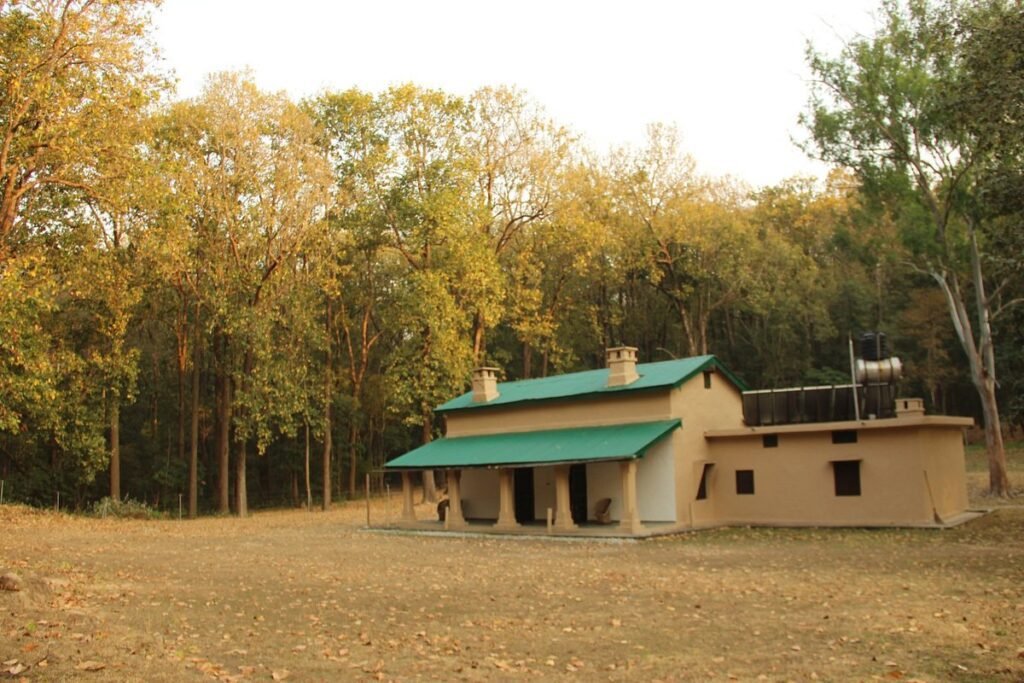
Sultan FRH
Sultan Forest Rest House, located in Jim Corbett National Park, is the park’s oldest rest house, offering a glimpse into its rich history. Surrounded by dense forests, it provides a quiet and secluded stay, ideal for those looking to experience the wilderness up close. The rest house features basic accommodations, allowing guests to connect with nature in a rustic setting. Its strategic location makes it a good spot for early morning and late evening wildlife sightings, particularly of tigers and elephants. Sultan FRH is perfect for visitors seeking a peaceful and authentic jungle experience.
Forest Rest House – 2 Double Rooms
Canteen – Not Available
How to Reach Dhikala Zone
Reaching Dhikala Zone is relatively straightforward, though it requires some planning.
By Road: Dhikala is accessible via Ramnagar, the nearest town, which is well-connected by road to major cities like Delhi and Dehradun. From Ramnagar, you can hire a jeep to take you directly to Dhikala.
By Train: The nearest railway station is Ramnagar, just 18 km from the park’s entry gate. Trains from Delhi and other major cities frequently stop here.
By Air: The closest airport is in Pantnagar, about 80 km away. Alternatively, you can fly to Delhi and take a road trip to the park.
Entry Points and Permissions: Visitors must obtain entry permits from the park authorities. It’s advisable to book these well in advance, especially during peak seasons.
Best Time to Visit Dhikala Zone
The best time to visit Dhikala Zone largely depends on what you hope to see. The park remains open from mid-November to mid-June, with each season offering a different experience.
Winter (November to February): This is the best time for tiger sightings as the big cats are often seen basking in the sun. The weather is cool and pleasant, making it ideal for safaris.
Summer (March to June): As water sources dwindle, animals congregate around rivers and waterholes, increasing the chances of sightings. However, temperatures can soar, so be prepared for the heat.
Monsoon (July to September): The park is closed during the monsoon season due to heavy rains and flooding, which makes the terrain unsafe for safaris.
Photography Tips for Dhikala Zone
Photographing wildlife in Dhikala requires both skill and patience.
Capturing the Best Wildlife Shots: Early mornings and late afternoons offer the best lighting. Be patient and ready to capture the moment as wildlife can appear unexpectedly.
Equipment Recommendations: A DSLR with a telephoto lens is ideal for capturing detailed shots of distant animals. Binoculars can also be handy for spotting wildlife from afar.
Ethical Photography Practices: Respect the animals and their habitat. Avoid using flash photography, and don’t disturb the wildlife for the sake of a perfect shot.
Tips for Planning Your Trip
A well-planned trip ensures you make the most of your visit to Dhikala.
Essential Items to Pack: Bring light, comfortable clothing suitable for both warm days and cool nights. Be sure to pack a hat, sunglasses, sunblock, and insect repellent. A good pair of binoculars and a camera are must-haves for wildlife spotting.
Health and Safety Considerations: While Dhikala is generally safe, it’s important to be aware of your surroundings. Carry any necessary medications, and consider getting vaccinated for diseases like malaria if you plan to visit during the monsoon season.
Navigating Permits and Fees: Ensure you have all the necessary permits and have paid the required fees before entering the park. It’s also a good idea to carry some extra cash for tips and any unexpected expenses.
FAQs
Is Dhikala Zone suitable for families with children?
- Yes, Dhikala Zone is family-friendly, but it’s essential to follow safety guidelines, especially during safaris.
Can you visit Dhikala Zone without a safari?
- While the safaris are the main attraction, you can also explore certain areas on foot with a guide. However, a safari is highly recommended for the best experience.
What is the best way to spot tigers in Dhikala?
- The best chance of spotting tigers is during early morning or late afternoon safaris when the animals are most active.
Are there any medical facilities in Dhikala Zone?
- Basic medical facilities are available at the Dhikala Forest Lodge, but it’s advisable to carry essential medicines and first aid supplies.
How can one contribute to conservation efforts in Dhikala Zone?
- Visitors can contribute by following park rules, minimizing their environmental impact, and supporting local conservation initiatives through donations or volunteering.